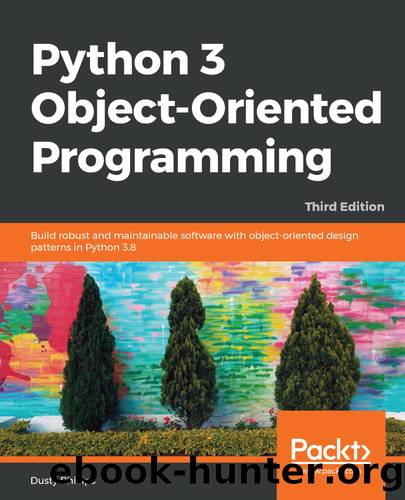Python 3 Object-Oriented Programming by Dusty Phillips

Author:Dusty Phillips [Dusty Phillips]
Language: eng
Format: epub
Tags: COM051000 - COMPUTERS / Programming / General, COM051360 - COMPUTERS / Programming Languages / Python, COM051210 - COMPUTERS / Programming / Object Oriented
Publisher: Packt Publishing
Published: 2018-11-14T07:33:16+00:00
def one(timer):
format_time("Called One")
def two(timer):
format_time("Called Two")
def three(timer):
format_time("Called Three")
class Repeater:
def __init__(self):
self.count = 0
def repeater(self, timer):
format_time(f"repeat {self.count}")
self.count += 1
timer.call_after(5, self.repeater)
timer = Timer()
timer.call_after(1, one)
timer.call_after(2, one)
timer.call_after(2, two)
timer.call_after(4, two)
timer.call_after(3, three)
timer.call_after(6, three)
repeater = Repeater()
timer.call_after(5, repeater.repeater)
format_time("Starting")
timer.run()
This example allows us to see how multiple callbacks interact with the timer. The first function is the format_time function. It uses the format string syntax to add the current time to the message; we'll read about them in the next chapter. Next, we create three simple callback methods that simply output the current time and a short message telling us which callback has been fired.
The Repeater class demonstrates that methods can be used as callbacks too, since they are really just functions that happen to be bound to an object. It also shows why the timer argument to the callback functions is useful: we can add a new timed event to the timer from inside a presently running callback. We then create a timer and add several events to it that are called after different amounts of time. Finally, we start the timer running; the output shows that events are run in the expected order:
02:53:35: Starting 02:53:36: Called One 02:53:37: Called One 02:53:37: Called Two 02:53:38: Called Three 02:53:39: Called Two 02:53:40: repeat 0 02:53:41: Called Three 02:53:45: repeat 1 02:53:50: repeat 2 02:53:55: repeat 3 02:54:00: repeat 4
Python 3.4 introduced a generic event loop architecture similar to this. We'll be discussing it later, in Chapter 13, Concurrency.
Download
This site does not store any files on its server. We only index and link to content provided by other sites. Please contact the content providers to delete copyright contents if any and email us, we'll remove relevant links or contents immediately.
| Ada | Ajax |
| Assembly Language Programming | Borland Delphi |
| C & C++ | C# |
| CSS | Compiler Design |
| Compilers | DHTML |
| Debugging | Delphi |
| Fortran | Java |
| Lisp | Perl |
| Prolog | Python |
| RPG | Ruby |
| Swift | Visual Basic |
| XHTML | XML |
| XSL |
The Mikado Method by Ola Ellnestam Daniel Brolund(23075)
Hello! Python by Anthony Briggs(22236)
Secrets of the JavaScript Ninja by John Resig Bear Bibeault(20916)
Kotlin in Action by Dmitry Jemerov(19963)
The Well-Grounded Java Developer by Benjamin J. Evans Martijn Verburg(19913)
OCA Java SE 8 Programmer I Certification Guide by Mala Gupta(19196)
Algorithms of the Intelligent Web by Haralambos Marmanis;Dmitry Babenko(17993)
Grails in Action by Glen Smith Peter Ledbrook(17131)
Sass and Compass in Action by Wynn Netherland Nathan Weizenbaum Chris Eppstein Brandon Mathis(14602)
Test-Driven iOS Development with Swift 4 by Dominik Hauser(11089)
Windows APT Warfare by Sheng-Hao Ma(7852)
Layered Design for Ruby on Rails Applications by Vladimir Dementyev(7562)
Blueprints Visual Scripting for Unreal Engine 5 - Third Edition by Marcos Romero & Brenden Sewell(7474)
Solidity Programming Essentials by Ritesh Modi(4586)
Functional Programming in JavaScript by Mantyla Dan(4538)
Hands-On Full-Stack Web Development with GraphQL and React by Sebastian Grebe(4448)
WordPress Plugin Development Cookbook by Yannick Lefebvre(4413)
Unity 3D Game Development by Anthony Davis & Travis Baptiste & Russell Craig & Ryan Stunkel(4282)
The Ultimate iOS Interview Playbook by Avi Tsadok(4270)
